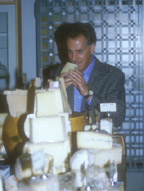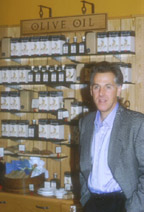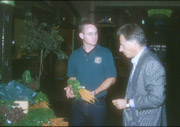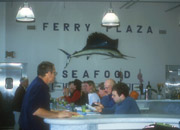The
Ferry Building Marketplace: A Food Lovers’ Mecca
 |
| Marketplace
Majordomo Steve Carlin enjoys the fruits of his labors |
By Susan Williams
Now restored to its original
grandeur, the beautiful arcade of San Francisco’s
beloved Ferry Building now serves as a food lovers’ mecca. The
building’s interior marketplace, which houses a rare collection of
fine artisan food shops, attracts hungry hoards each day—
financial district employees, tourists and buyers for fine San
Francisco restaurants.
Extensive renovation was required,
however, to reclaim the building’s 1890’s charm. And the efforts
of Steve Carlin, Project Manager for developer Wilson Meany
Sullivan, were needed to attract just the right mix of merchants to
create a compelling marketplace reminiscent of Europe.
Looking Back
From the day the Ferry Building
opened in 1898, it was a bustling transportation hub. It was the
destination for anyone traveling by train from the East Coast, the
East Bay or Marin County. And, as many as 50,000 ferry commuters
streamed through the building daily. When the Golden Gate and Bay
Bridges opened in the 30’s, however, car travel became the
preferred way to commute into San Francisco. The drop in ferry
travel left the building practically deserted. In 1955, after years
of neglect, the building’s dramatic central nave was divided into
offices. Two years later, the newly constructed Embarcadero Freeway
dealt the final blow to the Ferry Building; it hid the beautiful
façade and severed the former icon from
Market Street.
When the 1989 Loma Prieta
Earthquake destroyed the freeway and forced its teardown, the
renaissance of San Francisco’s northeast
waterfront began. The City decided that it was time to restore the
aging landmark.
Renovation began in 2001 with the
goal of melding the building’s vintage charm with the requirements
of a marketplace. First, the offices were removed from the building’s
central nave, the 660-foot long, 3-story high hallway that
would house the vendors. Workers exposed and restored brick masonry
arches, wrought iron trusses and the gabled
skylight that stretches the length of the hall. Linoleum flooring
was torn up to reveal mosaic tile. Nearly 140,000 tiles were
replaced by five workers who devoted almost a year to the task.
The Marketplace
As the renovation work moved
forward, Steve Carlin, the Marketplace Manager for developer Wilson
Meany Sullivan, was busy recruiting vendors that could meet their
strict criteria. "Many businesses were interested in coming
in," says Carlin, "but, we went after the ones we wanted—small,
family-owned companies that either create unique artisan goods, grow
the highest quality organic produce, or operate some of the finest
restaurants in the Bay Area."
And they wanted merchants who
would offer more than a great place for financial district workers
to stop for lunch. They visualized primarily a
"working marketplace, where the best restaurants in San
Francisco would drive their trucks every morning to stock up on
high-quality ingredients, such as Acme’s freshly baked bread, Ciao
Bella gelato, Frog Hollow organic pears, Golden Gate meats and
Stonehouse olive oils." Eliminating the expense of the
middleman and increased convenience for the restaurants would be the
results.
Carlin is proud of the way the
project has turned out. "It’s a lot of things coming together—the
historic building, the bay front location and the extraordinary
merchants."
With the Ferry Building
Marketplace, Carlin maintains that the Bay Area has finally gotten
what it has been hoping for. "The marketplace provides a
different shopping experience than supermarkets or even high-end
specialty food stores," says Carlin. "A collection of
shops each specializing in a certain food is common in Europe, but
not in this country."
"The marketplace is an
expression of the artisan food community around us. There was a pent
up need for that expression among the merchants themselves and on
the part of the consumer. Our mantra," says Carlin "was to
create a shopping experience so compelling that even if Whole Foods
or Andronico’s moved in across the street, business at the
marketplace would not be affected."
Expanding into an unproven retail
center during a down economy was a risk for the merchants, but they
have been doing well, says Carlin. "Everyone I’ve talked to
says they’re exceeding their financial expectations."
A stroll through the marketplace,
with the bounty of the merchants’ stalls spilling out into the
central walkway, confirms that the project management team met its
goals. The rows of shops with crates of colorful fruits and
vegetables, the racks of fresh bread, the flower stalls and the
cafes and delis delight the eye and the nose as well. But of course,
to truly appreciate the marketplace you must stop to eat. Buy a
sandwich at LuLu Petite or Mastrelli’s Deli or Mistral Rotisserie
Provencal, then find yourself a spot with a sweeping view of the
Bay.
Described below are just a few
favorites:
Recchiuti Confections
Monday through Friday:
11am – 7 pm
Saturday: 8 am – 6 pm
Sunday 11 am – 5 pm
Founded by Michael and Jacky
Recchiuti, a husband and wife team, Recchiuti Confections displays
their artisan chocolates with the understated elegance of a fine
jeweler. In a dull green case with a glass top, small clusters of
chocolates sit on creamy-white saucers, which rest on a bed of
crushed cocoa beans. Some chocolates are actually carved with facets
like gemstones. Using the best beans from around the globe, Michael
makes the confections by hand following the traditions of Belgium
and France. With flavors ranging from the classic chocolate-caramel
to the exotic tarragon-grapefruit, pink peppercorn and rose petal, a
single piece can satisfy a true chocolate lover for a day or two.
"Michael is a master of
unique flavor combinations," says Dede who works at the shop.
"You can’t find chocolates like these anywhere else."
Cowgirl Creamery’s Artisan
Cheese Shop
Monday through Friday: 9 am – 6
pm
Saturday: 8 am – 5 pm
Sunday: 10 am – 4 pm
Cheese wheels stacked high on
crates and a fresh-creamy-pungent aroma greet visitors to the
Cowgirl Creamery. Founded in 1997 by Peggy Smith and Sue Conley, two
Bay Area chefs, the creamery features their own cheeses made from
organic milk at their Point Reyes facility. Their St Pat cheeses are
small rounds wrapped in hand-picked nettles, bathed in white wine
and left to age for two-weeks. Red Hawk, a triple cream washed-rind
variety, won Best of Show at this year’s American Cheese Society
competition. Soft-ripened cheeses, fromage blanc and crème fraiche
are all made fresh daily and sold at the shop. Also offered are
selections from the best farmstead and artisan cheese makers around
the world, such as Jean d’Alos in France and Neals Yards English
Farmhouse Cheese.
One customer told us,"A
houseguest entertained me for two weeks by bringing me a different
cheese from Cowgirl everyday—always a kind he’d never even heard
of. It was glorious."
McEvoy Ranch
Saturday: 8 am – 6 pm
Tuesday – Wednesday: 10 am – 6
pm Sunday: 10 am – 5 pm
Thursday – Friday: 10 am – 7
pm Closed Mondays
With the finest varieties of
Tuscan olives and milling equipment imported straight from Italy,
Nan McEvoy began to make olive oil in 1991. More than a decade
later, her 550-acre ranch in the Marin County hills boasts 18,000 organically
grown olive trees. Under the direction of Italian olive oil guru
Maurizio Castelli, it now produces award-winning olive oil. A
favorite is the 2001 extra virgin olive oil, a green-gold oil with
the aroma of fresh cut grass and a slight peppery note.
 |
| Carlin
before a rack of olive oil of the Gods |
Early each fall at McEvoy Ranch,
olives are harvested by hand and milled the Italian way. Thick
granite wheels crush the olives. Then a Rapanelli mill, the only one
of its kind in the US, extracts the olive oil gently with no heat or
pressure—so as not to disturb the subtle flavors. The result is an
extremely pure grade olive oil perfect for cooking or dipping.
Capay Organic Fruits and
Vegetables Sunday – Friday: 10 am – 6
pm
Saturday: 8 am – 6 pm
Capay’s sells the best of
Northern California’s organic produce. This fall the shop offers
Satsumi Mandarins sliced open for tasting, succulent Heirloom
Tomatoes, dark green Swiss Chard with orange-pink stems, and
gourds.of every shape and size.
Capay’s 240-acre family farm, is
nestled in the Coastal Range almost 100 miles northeast of San
Francisco. Founded by Kathleen Barsotti in 1976, it was one of the
first organic farms in the region. Kathleen’s four sons now own
the farm and operate it using the same safe and sustainable methods.
 Hog
Island Oyster Company Monday – Saturday
Hog
Island Oyster Company Monday – Saturday
11 am – 7:30 pm
Closed Sunday
Located on Tomales Bay, a National
Marine Estuary, Hog Island Oyster Company began harvesting oysters
in 1982. Today it grows and sells over 3 million oysters a year. Hog
Island received "The Best American Oyster" award from the
San Francisco Chronicle and the "Award of Excellence for Animal
Husbandry" from the American Institute of Food & Wine.
The single seed method, an
expensive and labor-intensive way to grow oysters, is one of the
secrets to Hog Island’s exceptional quality. Another is the
Tomales Bay location with its shallow water and abundance of
plankton. Delicious oyster meat and long-shelf life are the results.
